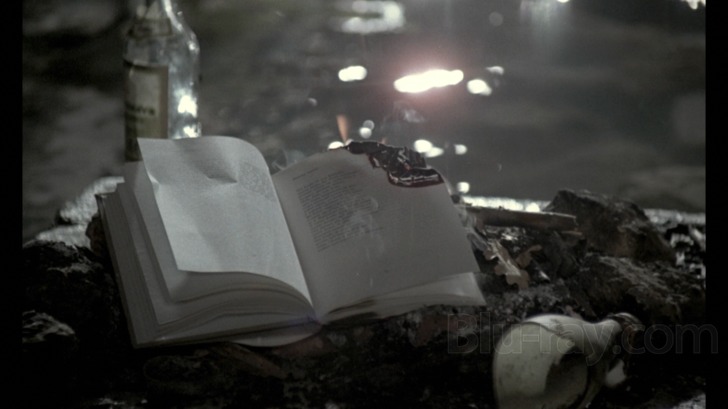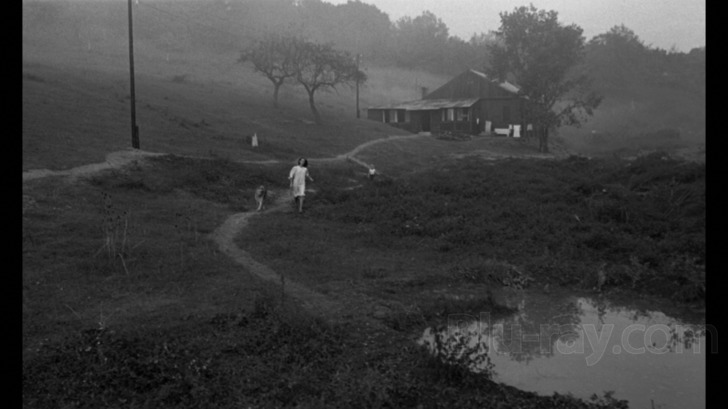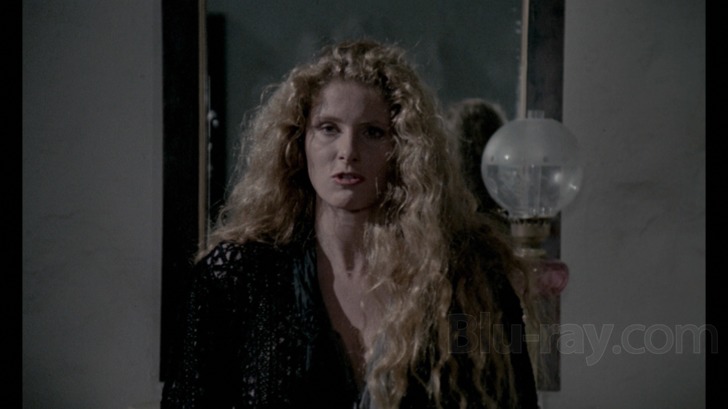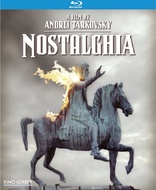Nostalghia Blu-ray Movie
HomeNostalghia Blu-ray Movie 
Kino Lorber | 1983 | 125 min | Not rated | Jan 21, 2014Movie rating
7.6 | / 10 |
Blu-ray rating
| Users | 0.0 | |
| Reviewer | 4.0 | |
| Overall | 4.0 |
Overview
Nostalghia (1983)
At a spa in the Tuscan Hills, a Russian poet and musicologist, researching the life of an 18th century composer, meets a mysterious man who is convinced that the end of the world is nigh. The Russian, Andrei Gorchakov (Oleg Yankovsky), is asked to cross an ancient sulphur pool carrying a lighted candle as an act of faith. Tarkovsky's first film outside the USSR is full of personal and Christian symbols and works as a study of such themes as memory, melancholia and disenchantment with the material world.
Starring: Oleg Yankovsky, Erland Josephson, Delia Boccardo, Milena Vukotic, Domiziana GiordanoDirector: Andrei Tarkovsky
| Drama | Uncertain |
| Foreign | Uncertain |
Specifications
Video
Video codec: MPEG-4 AVC
Video resolution: 1080p
Aspect ratio: 1.67:1
Original aspect ratio: 1.66:1
Audio
Italian: LPCM 2.0 (48kHz, 24-bit)
Subtitles
English
Discs
50GB Blu-ray Disc
Single disc (1 BD)
Playback
Region A (B, C untested)
Review
Rating summary
| Movie | 4.5 | |
| Video | 3.5 | |
| Audio | 3.5 | |
| Extras | 0.5 | |
| Overall | 4.0 |
Nostalghia Blu-ray Movie Review
Carrying the Fire
Reviewed by Casey Broadwater January 21, 2014From the mythological story of Prometheus to Cormac McCarthy’s The Road, fire has long been an unquenchable symbol of the human spirit, burning dimly in the vast existential darkness of an unfeeling universe. (Depressing, or inspiring?) But fire, always shifting, has also had an array of other linked associations—birth and death (and cyclical rebirth), burning damnation and all-consuming passion, transmutation and constancy. The most lasting symbols are those that are simple but evoke endless complex emotions and interpretations. To extend that idea to the world of cinema —particularly auteurist cinema—one sign of a great film, I think, is its ability to suggest much with little, to open itself to multitudes of subjective insights, observations, and feelings. An undisputed master of this form was Andrei Tarkovsky, whose seven feature films constitute a dense body of visual poetry that must be felt far before it can be articulated in words. Nostalghia especially, his penultimate film, is an intuitive rather than intellectual experience—one that involves much fire symbolism—and it’s also Tarkovsky’s most directly personal work, imbued with a dark, particularly Russian form of the title’s wistful longing for the past and the far away.

Shot in Italy in 1982, Nostalghia was Tarkovsky’s first film produced outside of the U.S.S.R., and it would mark the beginning of a self-imposed exile from his home country, where he felt creatively stymied by government authorities who had begun to increasingly censor and regulate his work. Leaving his wife and son behind, hoping they could eventually secure exit visas to stay with him, he made Nostalghia, produced an opera in London, directed The Sacrifice—his final film—in Sweden, and then died of lung cancer in Paris in 1986, a man without a home. He never returned to Russia, but he clearly pined for it; in his excellent memoir Sculpting In Time, he describes his own feelings and his intent for Nostalghia: “I wanted the film to be about the fatal attachment of Russians to their national roots, their past, their culture, their native places, their families and friends; an attachment which they carry with them all their lives, regardless of where destiny may fling them.” Though it was made in Italy, Tarkovsky called the film “Russian in every way: morally, politically, emotionally.” But, at the same time, the inner, psychological journey of the protagonist—who is very much a stand-in for Tarkovsky himself—is wholly universal. His irremovable, back-of-the-mind longing for his home, and his frustrated inability to truly understand the life and culture of the foreign land in which he finds himself adrift, are feelings every lonely stranger abroad has felt.
In Nostalghia, that stranger is Andrei Gorchakov (Oleg Yankovsky), a poet and intellectual who travels to Italy to research the life of an obscure 18th century Russian serf who was himself sent to Italy—by his feudal lord—and trained as a composer. Gorchakov is an expert in Italian art, but arriving in the country, he finds that he is unmoved when experiencing its cultural icons in person. (There’s something here about creating an idealized version of a place—almost like its perfect incarnation in Plato’s Realm of Forms—in one’s mind.) In fact, he’s entirely disinterested. When his attractive translator, Eugenia (Domiziana Giordano), takes him to see the Madonna del Parto—a fresco in Monterchi, where women come to pray for fertility and safety in childbirth—Gorchakov refuses to leave the car, explaining, “I’m fed up with all your beauties.” He has given himself over to a kind of willful alienation, recognizing that, as a Russian, he can never genuinely grasp what any of this art means to those Italians who created it and those for whom it was intended. Outsiders can never be insiders. Or, as he puts it in an argument with his translator, “Poetry is untranslatable.”
After spurning the advances of the superficial Eugenia, who only seems interested in art in so far as it can help her obtain “a man”—there’s a Madonna/Whore complex here that’s an oddly misogynistic blot on an otherwise beautiful film—Gorchakov falls into a depression, plagued with black and white flashbacks to his wife, children, and native home. In his morose state, he becomes obsessed with Domenico (Erland Josephson), a local mathematician-turned-madman who, fearing the end of the world, kept his family locked in their house for seven years. Alone now, Domenico rails against the disconnectedness of the impersonal modern age, where the happy and successful can’t bear to look the sick and mentally ill in the eye. A man of firm convictions, he goes out in a literal blaze of glory, making a self-sacrificial point about the need to “go back to where we were...to the main foundations of life.” Before this act, Domenico—hoping that this might somehow save him from his chosen fate, and maybe even save the world—asks Gorchakov to follow through with his own irrational, symbolic performance and carry a lit candle from one end of a drained hot spring to the other without letting the fire go out. This scene forms the film’s endurance-test of a climax, a nearly nine-minute unbroken tracking shot of Gorchakov starting, failing, and then doubling back to try again, slowly making his way through the sulfurous muck, guarding the flickering flame against the wind with a trembling hand.
Some might say that the film, as a whole, is an endurance test, and those uninitiated into Tarkovsky’s style of filmmaking—where atmosphere and inner truths take precedence over plot and outer action—will probably find Nostalghia to be a challenging viewing experience. Alienation is the name of the game here, after all, and Tarkovsky, unafraid of alienating his own viewers, makes no concessions to “conventional” moviemaking. (Perhaps not coincidentally, the film was written with Tonino Guerra, who co-wrote Michelangelo Antonioni’s “Trilogy of Alienation,” L'Avventura, La Notte, and L'Eclisse.) Shots are held for interminable lengths. Images go unexplained. Motivations often remain opaque. To some extent, as viewers, we’re a bit like Gorchakov—lost in a strange, unfamiliar land that sometimes makes little sense. But even if we cannot comprehend it fully, Nostalghia is a journey worth taking, filled with striking images and sudden enlightenments and a sense of the deep, inconsolable yearning that is itself a hallmark of human existence; a longing for what no longer is and what may yet be. In a rare moment of optimism for Tarkovsky, the film ends with a pulled back view of a surreal landscape that instantly reconciles the near and the far, love and loss, in something as close to heaven as can be imagined.
Nostalghia Blu-ray Movie, Video Quality 

For such a highly anticipated release, Kino-Lorber's treatment of Nostalghia is slightly disappointing, if only because you can easily imagine the film looking better than it does here. This is not to say that Kino's 1080p/AVC-encoded transfer isn't the best Nostalghia has ever looked on home video—it is, and it's vastly better than prior DVD (and VHS!) releases—only that there's still room for improvement. It's Kino's custom to largely present film prints or their original negatives "as-is," making minor color/contrast adjustments but not providing any additional restoration work of their own. That is, if a film has been restored, that work is typically done by whoever supplies Kino with the materials. This is opposed to, say, The Criterion Collection, who do painstaking frame-by-frame restorations in-house. In any case, Nostalghia—which has been newly remastered in HD from archival 35mm elements, according to the back of the Blu-ray case—could use a bit of a cleanup. Specks and small scratches and bits of debris occasionally dot the frame, and you'll even see a few hairs stuck around the edges. There's a general grubbiness here that could almost certainly be attenuated with some careful digital tidying. All that said, Nostalghia still impresses in high definition for the first time. Clarity sees a significant boost—you'll notice previously unseen fine detail in closeups—and Tarkovsky's bleak color palette, which veers from stark monochrome to muted, moody hues and everything in between, is beautifully reproduced. The 35mm grain structure is intact as well, and there are no signs of edge enhancement or overly harsh compression. This isn't the best the film could look, but it will definitely do until Nostalghia makes its inevitable 4K debut sometime in the indeterminate future.
Nostalghia Blu-ray Movie, Audio Quality 

Like the print, the film's Linear PCM 2.0 track exhibits some signs of age—a low level hiss here and there, a bit of light crackling—but nothing detrimental or harsh. Dialogue, which is primarily in Italian with a smattering of Russian, is generally well-balanced and unhindered. The biggest benefit the uncompressed codec brings is to Tarkovsky's use of music, particularly Beethoven's Symphony No. 9, which sounds bold and appropriately jarring in its context here. The disc includes optional English subtitles, which appear in easy-to-read white lettering.
Nostalghia Blu-ray Movie, Special Features and Extras 

It's unfortunate that Kino-Lorber couldn't source any extras for the disc—besides a high definition trailer—as this is the sort of film that cries out for a scholarly commentary track and some archival interview clips from the director. Better yet, it would've been fantastic if Kino could've secured the rights to Voyage In Time, the documentary Tarkovsky and screenwriter Tonino Guerra made about the making of Nostalghia.
Nostalghia Blu-ray Movie, Overall Score and Recommendation 

Andrei Tarkovsky's second-to-last film captures the sublime feeling of longing that aches in the back of our brains whenever we're away from who and what we love. Nostalghia is a beautiful—if difficult—experience, slow and overwhelming and jarring in unexpected ways, and its influence is perhaps most fully felt in the recent films of Terrence Malick, which deal with similar intangibilities of existence. Kino-Lorber's new Blu-ray edition is not quite as comprehensive—or cleaned up—as it could be, but this release belongs in every cinephile's collection. Highly recommended.
Similar titles
Similar titles you might also like

The Sacrifice 4K
Offret
1986

Ivan's Childhood
Ива́ново де́тство / Ivanovo detstvo
1962

Andrei Rublev
Андрей Рублёв | Andrey Rublev | Tarkovsky's Preferred Cut and Original versions
1966

Mirror
Зеркало / Zerkalo
1975

Stalker
Сталкер
1979

The Turin Horse
A Torinói ló
2011

Red Desert
Il deserto rosso
1964

The Conformist
Il Conformista | 4K Restoration
1970

Wild Strawberries
Smultronstället
1957

Sansho the Bailiff
山椒大夫 / Sanshô dayû
1954

Accattone
1961

La Dolce Vita
1960

The Club
El Club
2015

Out 1
Out 1, noli me tangere
1971

Satantango
Sátántangó
1994

Germany Year Zero
Germania anno zero
1948

Werckmeister Harmonies
Werckmeister harmóniák / includes "Family Nest" (1979)
2000

Perfect Days 4K
2023

Paris, Texas 4K
1984

Tommaso
2019


